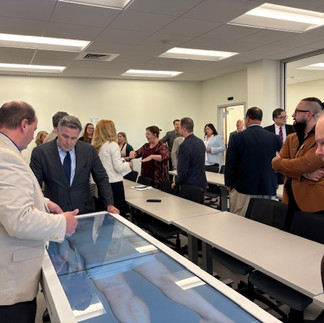- PANA

- Nov 3, 2025
Dr. Ledys Janett Perez:
Being a Latina CRNA fills me with immense pride—especially during Hispanic Heritage Month, a time to honor the culture, resilience, and the contributions of our community. Every day, I carry the strength of my ancestors and the sacrifices of my family into the operating room. As a first-generation Latina in this role, I understand the power of visibility and representation. This month reminds me that being a Latina CRNA is more than a career—it’s a celebration of identity, a reflection of perseverance, and a promise to uplift those who will come after me.
Gianka Figueroa:
“I’m a third year SRNA at Cedar Crest College. When I’m not in the OR or studying, you can usually find me traveling or playing pickleball. Both of my parents are from Nicaragua, and I love visiting family there whenever I can. I also hope to take part in a medical mission trip once I graduate! My biggest inspiration in this journey has been my mom, she is a CRNA and the reason I fell in love with this amazing profession. I can’t wait to work alongside her soon!”
Dr. Virginia Urdaneta:
Being a Latina anesthesia provider makes me proud because I am not only perpetuating the dream of my immigrant parents, but of so many others as well. I hope to be the representation that makes at least one person feel better, whether it be my Latino patients, or a fellow dreamer hoping to become a CRNA!
Dr. Jorge Alvarez:
“My work providing anesthesia is a daily source of gratitude. This month, I’m especially mindful of my family’s humble beginnings in the Dominican Republic and their incredible sacrifice and hard work that turned the hope for a better future in this country into a reality for me.”
Jennifer Salinas:
"My name is Jennifer Salinas. I am a first-year student at Thomas Jefferson’s CRNA program. My family and I are from Cuenca, Ecuador and we enjoy cooking traditional recipes for our family friends. I am very excited to form part of the TJU cohort!"
Arianna Aguilar SRNA:
Born and raised in El Salvador, I came to the U.S. at 19, working as a housekeeper while taking ESL classes. Over a decade later, I have more than five years of nursing experience and am now proudly pursuing my dream as an SRNA. Representation matters deeply to me. Every patient deserves culturally sensitive care and to feel understood. Just as importantly, visibility shows immigrants and first-generation nurses that our challenges build resilience—not barriers. We belong, and I hope my journey reminds others of that truth.



















